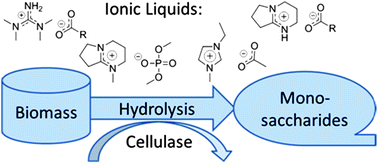Cellulose hydrolysis with thermo- and alkali-tolerant cellulases in cellulose-dissolving superbase ionic liquids
Abstract
Pretreatment with

* Corresponding authors
a
VTT – Technical Research Centre of Finland, P.O. Box 1000, VTT, Tietotie 2, Espoo, Finland
E-mail:
ronny.wahlstrom@vtt.fi
Fax: +358 20 722 7071
Tel: +358 40 02 54 073
b Laboratory of Organic Chemistry, Department of Chemistry, University of Helsinki, PO Box 55, A. I. Virtasen Aukio 1, Helsinki, Finland
Pretreatment with

 Please wait while we load your content...
Something went wrong. Try again?
Please wait while we load your content...
Something went wrong. Try again?
R. Wahlström, A. King, A. Parviainen, K. Kruus and A. Suurnäkki, RSC Adv., 2013, 3, 20001 DOI: 10.1039/C3RA42987C
To request permission to reproduce material from this article, please go to the Copyright Clearance Center request page.
If you are an author contributing to an RSC publication, you do not need to request permission provided correct acknowledgement is given.
If you are the author of this article, you do not need to request permission to reproduce figures and diagrams provided correct acknowledgement is given. If you want to reproduce the whole article in a third-party publication (excluding your thesis/dissertation for which permission is not required) please go to the Copyright Clearance Center request page.
Read more about how to correctly acknowledge RSC content.
 Fetching data from CrossRef.
Fetching data from CrossRef.
This may take some time to load.
Loading related content
